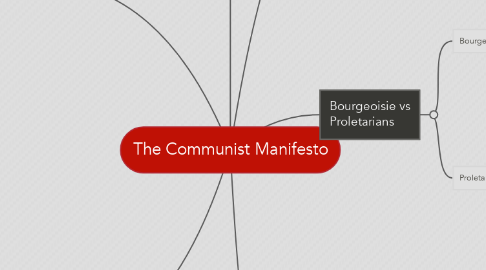
1. The Beginning
1.1. Bourgeoisie
1.1.1. Emerged around the time that the Industrial Revolution began
1.1.1.1. With the invention of machinery and more effective ways to run factories, a very high demand for goods was created. This allowed the factory owners to become very competitive and thus the bourgeoisie was created.
1.1.1.1.1. Karl Marx and Friedrich Engels, The Communist Manifesto, 1998, 10
1.1.2. The emergence of this class has affected all other social classes in one way or another.
1.1.2.1. The ability to cheaply and effectively produce goods completely erased the "skilled laborer."
1.1.2.2. Shopkeepers and tradespeople don't have the capital to keep up with the bourgeoisie.
1.1.2.2.1. Karl Marx and Friedrich Engels, The Communist Manifesto, 1998, 19
1.2. Proletarians
1.2.1. Emerged shortly after the bourgeoisie.
1.2.1.1. Because shopkeepers, tradespeople, skilled laborers, and handicraftsmen could no longer keep up with the bourgeoisie, they sunk down below middle class to being a laborer.
1.2.1.1.1. Karl Marx and Friedrich Engels, The Communist Manifesto, 1998, 19
1.2.2. Their emergence mostly affected the bourgeoisie (along with the classes that were destroyed to create the proletarians)
1.2.2.1. By uniting into a union, the proletarians were able to fight back against the bourgeoisie by forcing them to raise wages to a livable standard.
1.2.2.1.1. Karl Marx and Friedrich Engels, The Communist Manifesto, 1998, 22
2. Why Class Struggle?
2.1. These two classes are engaged in a class struggle rather than a class competition due to their power imbalance and reliance on each other.
2.1.1. The bourgeoisie needs the proletarians to stay happy otherwise they will continue to try to raise wages and the bourgeoisie won't be able to make money.
2.1.2. The proletarians rely on the bourgeoisie as their livelihood, but at the same time have to fight back or they risk being erased from existence because they won't be able to survive.
2.1.2.1. Karl Marx and Friedrich Engels, The Communist Manifesto, 1998, 23
2.2. I believe that the bourgeoisie class is more at fault for this class struggle than the proletarians are.
2.2.1. "On the one hand by enforced destruction of a mass of productive forces; on the other, by the conquest of new markets, and by the more thorough exploitation of the old ones. That is to say, by paving the way for more extensive and more destructive crises, and by diminishing the means whereby crises are prevented."
2.2.1.1. Karl Marx and Friedrich Engels, The Communist Manifesto, 1998, 16
2.2.1.2. Though the proletarians protest by destruction of the bourgeoisie property, the bourgeoisie are relentless in their pursuit of material goods and wealth. In the end, nothing will stop them from trying to get what they want, resulting in this massive class struggle.
3. Class Struggle
3.1. We find class struggle as far back as Ancient Rome.
3.1.1. Karl Marx and Friedrich Engels, The Communist Manifesto, 1998, 9
3.2. Class struggle such as the "Third Estate" in France, and the medieval commune in Italy and France show that class struggle drives history forward.
3.2.1. Karl Marx and Friedrich Engels, The Communist Manifesto, 1998, 10
4. Division of Wealth
4.1. Societal structure is determined largely by how much wealth an individual or family has.
4.1.1. Along with wealth, classes are also determined by profession. Laborers and workers are in a different class from factory and large farm owners.
5. Bourgeoisie vs Proletarians
5.1. Bourgeoisie
5.1.1. The Industrial Middle Class
5.1.1.1. Karl Marx and Friedrich Engels, The Communist Manifesto, 1998, 10
5.1.2. Focused mostly on making money and reaching a social status above where they are currently at.
5.1.2.1. The competition generated by this is extremely revolutionary.
5.1.2.1.1. Karl Marx and Friedrich Engels, The Communist Manifesto, 1998, 13
5.2. Proletarians
5.2.1. The Modern Working Class
5.2.1.1. Karl Marx and Friedrich Engels, The Communist Manifesto, 1998, 17
5.2.2. They are a class of laborers who can only continue to exist as long as they can find work and make money to live off of.
5.2.2.1. Due to the industrial revolution, however, their jobs require little to no skill and as a result they are getting paid less and thus they sink lower and lower on the social ladder.
5.2.2.1.1. Karl Marx and Friedrich Engels, The Communist Manifesto, 1998, 17
6. Revolution
6.1. Marx and Engels predict a political revolution will be the result of these class struggles.
6.1.1. "The proletarian is without property; his relation to his wife and children has no longer anything in common with the bourgeois family relations; modern industrial labour, modern subjection to capital, the same in England as in France, in America as in Germany, has stripped him of every trace of national character.
6.1.1.1. Karl Marx and Friedrich Engels, The Communist Manifesto, 1998, 24
6.1.2. Because the proletarian class is so large, this political revolution is going to cause a shift in power from those with lots of wealth to the proletarian class.
6.1.3. "Society can no longer live under this bourgeoisie, in other words, its existence is no longer compatible with society."
6.1.3.1. Karl Marx and Friedrich Engels, The Communist Manifesto, 1998, 25
6.1.3.2. They are, in essence, saying that the bourgeoisie can no longer provide (as the political power) the basic rights that the proletarians need to continue their existence. And, as a result, the political power is going to transfer to the proletarian class.
6.1.3.2.1. "What the boureoisie, therefore, produces, above all, is its own grave-diggers. Its fall and the victory of the proletariat are equally inevitable."
